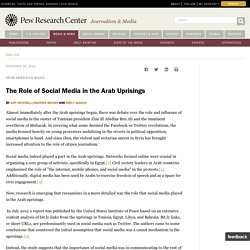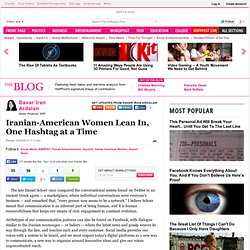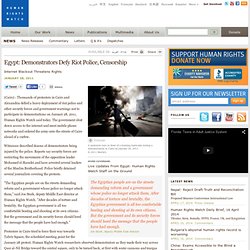

The Role of Social Media in the Arab Uprisings. Almost immediately after the Arab uprisings began, there was debate over the role and influence of social media in the ouster of Tunisian president Zine El Abidine Ben Ali and the imminent overthrow of Mubarak.

In covering what some deemed the Facebook or Twitter revolutions, the media focused heavily on young protesters mobilizing in the streets in political opposition, smartphones in hand. And since then, the violent and sectarian unrest in Syria has brought increased attention to the role of citizen journalism.[1] Social media indeed played a part in the Arab uprisings.
Networks formed online were crucial in organizing a core group of activists, specifically in Egypt.[2] Civil society leaders in Arab countries emphasized the role of "the internet, mobile phones, and social media" in the protests.[3] Additionally, digital media has been used by Arabs to exercise freedom of speech and as a space for civic engagement.[4] Footnotes [1] Storify compilation by Arnold, David. Journalism. " For News From Syrian Battleground, a Reliance on Social Media. Iranian-American Women Lean In, One Hashtag at a Time. The late Daniel Schorr once compared the conversational system found on Twitter to an ancient Greek agora -- a marketplace, where individual conversations were everyone's business -- and remarked that, "every person now seems to be a network.

" I believe Schorr meant that communication is an inherent part of being human, and it is human resourcefulness that keeps our means of civic engagement in constant evolution. Archetypes of our communication patterns can also be found on Facebook, with dialogue similar to the Iranian noonvayee -- or bakery -- where the latest news and gossip weaves its way through the line, and touches each and every customer. Social media provides our voices with a system to be heard, and we must respect today's digital platforms as a new way to communicate, a new way to organize around innovative ideas and give our voices unprecedented reach.
What's Fueling Protests in Arab World: People, Social Media or Both? Twitter, Facebook, and social activism. At four-thirty in the afternoon on Monday, February 1, 1960, four college students sat down at the lunch counter at the Woolworth’s in downtown Greensboro, North Carolina.

They were freshmen at North Carolina A. & T., a black college a mile or so away. “I’d like a cup of coffee, please,” one of the four, Ezell Blair, said to the waitress. “We don’t serve Negroes here,” she replied. The Woolworth’s lunch counter was a long L-shaped bar that could seat sixty-six people, with a standup snack bar at one end. The seats were for whites. By next morning, the protest had grown to twenty-seven men and four women, most from the same dormitory as the original four. By the following Monday, sit-ins had spread to Winston-Salem, twenty-five miles away, and Durham, fifty miles away.
The world, we are told, is in the midst of a revolution. These are strong, and puzzling, claims. Some of this grandiosity is to be expected. What makes people capable of this kind of activism? Wallflowers at the Revolution. Egypt: Demonstrators Defy Riot Police, Censorship. (Cairo) - Thousands of protesters in Cairo and Alexandria defied a heavy deployment of riot police and other security forces and government warnings not to participate in demonstrations on January 28, 2011, Human Rights Watch said today.

The government shut down access to the internet and most mobile phone networks and ordered the army onto the streets of Cairo ahead of a curfew. Witnesses described dozens of demonstrators being injured by the police. Reports say security forces are restricting the movements of the opposition leader Mohamed el-Baradei and have arrested several leaders of the Muslim Brotherhood. Police briefly detained several journalists covering the protests.
"The Egyptian people are on the streets demanding reform and a government whose police no longer attack them," said Joe Stork, deputy Middle East director at Human Rights Watch. Protesters in Cairo tried to force their way towards Tahrir Square, the scheduled meeting point for the January 28 protest. Activists take battle for Syria online - Middle East. Away from the sniper fire and daily violence on the streets of cities across Syria, another battle is simmering between supporters and opponents of the government of President Bashar al-Assad.

This fight is taking place not on the streets, but in the homes of online activists determined to silence the opposing side. In the latest attack, members of the activist groups Anonymous and RevoluSec claimed responsibility on Monday for hacking into the official websites of several Syrian government departments, including the ministries of transport and culture. They left their marks on each site, posting caricatures of Assad along with tips on how to avoid detection by Syria's online intelligence - known as the Syrian electronic army. They say the online operation is in reaction to attacks on activist sites by the electronic army, a pro-government hacking group. Q. Well, about 24 hours ago, we hacked and defaced the official sites of seven major Syrian cities. Q. Q. It works a few different ways.